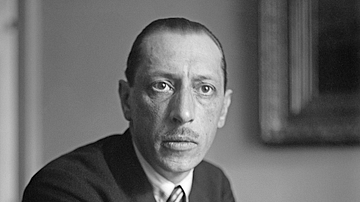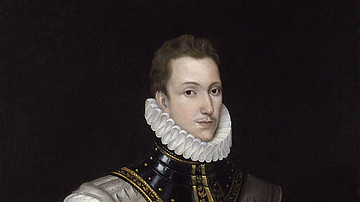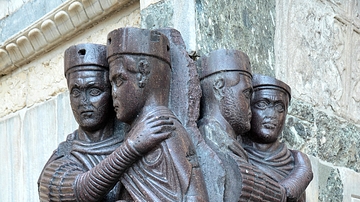Search
Did you mean: Nile?
Search Results

Definition
Napoleon's Italian Campaign
The Italian campaign of 1796-1797, waged by a young Napoleon Bonaparte, was a decisive campaign in the French Revolutionary Wars (1792-1802). It led to the defeat of Austria, the beginning of French control of northern Italy, and the end...

Definition
Albrecht Dürer
Albrecht Dürer (1471-1528 CE) was a German Renaissance artist who is considered one of the greatest painters and engravers in history. A native of Nuremberg, Dürer was famous in his own lifetime at home and abroad for his oil paintings, altarpieces...

Definition
Alexios I Komnenos
Alexios I Komnenos (Alexius Comnenus) was emperor of the Byzantine Empire from 1081 to 1118 CE. Regarded as one of the great Byzantine rulers, Alexios defeated the Normans, the Pechenegs, and, with the help of the First Crusaders, the Seljuks...

Definition
Kingdom of Jerusalem
The Kingdom of Jerusalem was a state created in 1099 CE by Crusaders and western settlers after the First Crusade (1095-1102 CE). With Jerusalem as its capital, the kingdom was the most important of the four Crusader States in the Middle...

Definition
Richard Wagner
Richard Wagner (1813-1883) was a German composer of Romantic music most famous for his epic operas like The Ring, Tannhäuser, and Tristan and Isolde. Wagner was concerned throughout his career with the theme of redemption through love and...

Definition
Igor Stravinsky
Igor Stravinsky (1882-1971) was a Russian composer best known for his works for the stage, such as the ballets The Firebird, Petrushka, and the groundbreaking The Rite of Spring. The modernist composer lived in Switzerland, France, and then...

Definition
Philip Sidney - The Gentleman-Poet of Elizabethan England
Sir Philip Sidney (1554-1586) was an English poet, scholar, soldier, and courtier, one of the most prominent figures at the court of Queen Elizabeth I of England (r. 1558-1603). During his lifetime, he was revered as the ideal Elizabethan...

Article
Medieval Cures for the Black Death
The Black Death is the 19th-century CE term for the plague epidemic that ravaged Europe between 1347-1352 CE, killing an estimated 30 million people there and many more worldwide as it reached pandemic proportions. The name comes from the...

Image
Map of Marco Polo’s Travels, 1271 - 1295
Marco Polo’s travels (1271–1295) represent one of the most famous European journeys into Asia during the late Middle Ages. Setting out from Venice with his father Niccolò and uncle Maffeo, Polo crossed through the Middle East and Central...

Image
Portrait of the Four Tetrarchs
Porphyry sculpture portraying the four Tetrarchs (Diocletian, Maximianus, Galerius and Constantius Chlorus) embracing. It is dated to c. 300 CE and was sculpted in Asia Minor. It probably originally decorated two separate pillars in Constantinople...